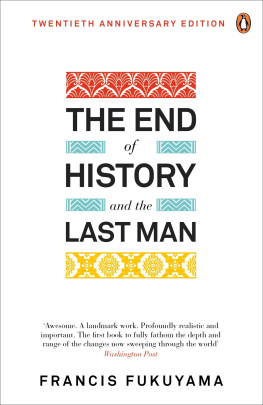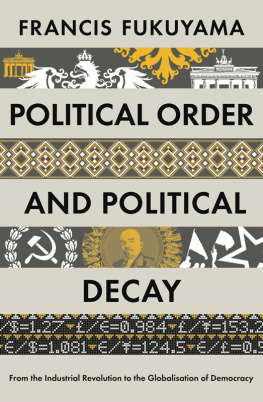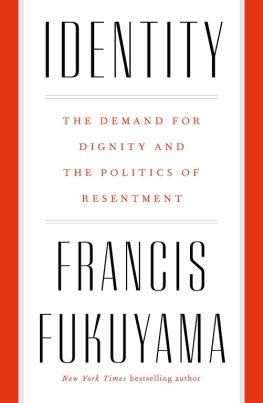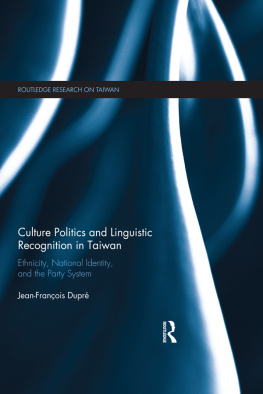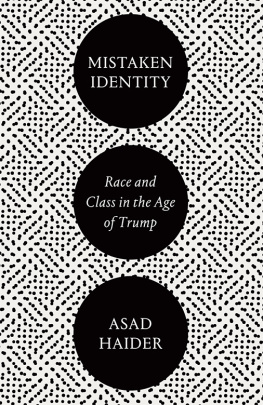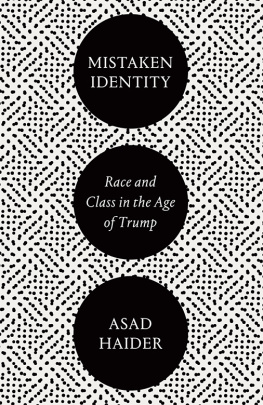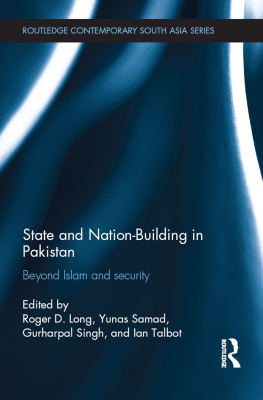IDENTITY
Francis Fukuyama is a Professor at Stanford University's Institute for International Studies and Director of the Institute's Center on Democracy, Development, and the Rule of Law. He has previously taught at Johns Hopkins University and at George Mason University. Fukuyama was a researcher at the RAND Corporation and served as the Deputy Director for the State Department's Policy planning staff. He has also served as a member of the President's Council on Bioethics. Francis Fukuyama is the author of The End of History, Political Order and Political Decay, The Origins of Political Order, The Great Disruption, Our Posthuman Future and State Building, among others. He lives with his wife in California.
ALSO BY FRANCIS FUKUYAMA
Political Order and Political Decay: From the Industrial Revolution to the Globalization of Democracy
The Origins of Political Order: From Prehuman Times to the French Revolution
America at the Crossroads: Democracy, Power, and the Neoconservative Legacy
State-Building: Governance and World Order in the Twenty-first Century
Our Posthuman Future: Consequences of the Biotechnology Revolution
The Great Disruption: Human Nature and the Reconstitution of Social Order
Trust: The Social Virtues and the Creation of Prosperity
The End of History and the Last Man
IDENTITY
THE
DEMAND FOR DIGNITY
AND THE
POLITICS OF RESENTMENT
FRANCIS FUKUYAMA

First published in Great Britain in 2018 by
Profile Books Ltd
3 Holford Yard
Bevin Way
London
WC1X 9HD
www.profilebooks.com
First published in the United States of America in 2018 by Farrar, Straus and Giroux
Copyright Francis Fukuyama, 2018
The moral right of the author has been asserted.
All rights reserved. Without limiting the rights under copyright reserved above, no part of this publication may be reproduced, stored or introduced into a retrieval system, or transmitted, in any form or by any means (electronic, mechanical, photocopying, recording or otherwise), without the prior written permission of both the copyright owner and the publisher of this book.
A CIP catalogue record for this book is available from the British Library.
ISBN 978 1 78125 9801
eISBN 978 178283 4173
For Julia, David, and John
CONTENTS
PREFACE
This book would not have been written had Donald J. Trump not been elected president in November 2016. Like many Americans , I was surprised by this outcome and troubled by its implications for the United States and the world. It was the second major electoral surprise of that year, the first being Britains vote to leave the European Union the previous June.
I had spent much of the last couple decades thinking about the development of modern political institutions: how the state, rule of law, and democratic accountability first came into being, how they evolved and interacted, and, finally, how they could decay. Well before Trumps election, I had written that American institutions were decaying as the state was progressively captured by powerful interest groups and locked into a rigid structure that was unable to reform itself.
Trump himself was both the product of and a contributor to that decay. The promise of his candidacy was that, as an outsider, he would use his popular mandate to shake up the system and make it functional again. Americans were tired of partisan gridlock and yearning for a strong leader who could unite the country again, breaking through what I labeled vetocracythe ability of interest groups to block collective action. This kind of populist upsurge was what put Franklin D. Roosevelt into the White House in 1932 and reshaped American politics for the next two generations.
The problem with Trump was twofold, having to do with both policy and character. His economic nationalism was likely to make things worse rather than better for the very constituencies that supported him, while his evident preference for authoritarian strongmen over democratic allies promised to destabilize the entire international order. With regard to character, it was hard to imagine an individual less suited to be president of the United States. The virtues that one associates with great leadershipbasic honesty, reliability, sound judgment, devotion to public interest, and an underlying moral compasswere totally missing. Trumps primary focus throughout his career had been on self-promotion, and he was perfectly happy to get around people or rules that stood in his way by any means available.
Trump represented a broader trend in international politics, toward what has been labeled populist nationalism.could be put in this category are Vladimir Putin of Russia, Recep Tayyip Erdoan of Turkey, Viktor Orbn of Hungary, Jaroslaw Kaczynski of Poland, and Rodrigo Duterte of the Philippines.
The global surge toward democracy that began in the mid-1970s has gone into what my colleague Larry Diamond calls a global recession. In 1970, there were only about 35 electoral democracies, a number that steadily increased over the next three decades until it reached nearly 120 by the early 2000s. The greatest acceleration came from 1989 to 1991, when the collapse of Communism in Eastern Europe and the former Soviet Union led to a democratic wave throughout that region. Since the mid-2000s, however, the trend has reversed itself, and total numbers have declined. Authoritarian countries, led by China, have meanwhile grown more confident and self-assertive.
It is not surprising that new would-be democracies such as Tunisia, Ukraine, and Myanmar should be struggling to build workable institutions, or that liberal democracy failed to take root in Afghanistan or Iraq after the U.S. interventions in those countries. It is disappointing, though not wholly surprising, that Russia has reverted to authoritarian traditions. What was far more unexpected was that threats to democracy should arise from within established democracies themselves. Hungary had been one of the first countries in Eastern Europe to overthrow its Communist regime. When it entered both NATO and the European Union, it appeared to have rejoined Europe as what political scientists characterized as a consolidated liberal democracy. Yet under Orbn and his Fidesz party, it has been leading the way toward what Orbn has labeled illiberal democracy. But a far bigger surprise yet were the votes in Britain and the United States for Brexit and Trump, respectively. These were the two leading democracies that had been the architects of the modern liberal international order, countries that led the neoliberal revolution under Ronald Reagan and Margaret Thatcher during the 1980s. Yet they themselves appeared to be turning away toward a more narrow nationalism.
This brings me to the origins of the present volume. Ever since I published my essay The End of History? in mid-1989, and the book The End of History and the Last Man in 1992, I have regularly been asked whether event X didnt invalidate my thesis. X could be a coup in Peru, war in the Balkans, the September 11 attacks, the global financial crisis, or, most recently, Donald Trumps election and the wave of populist nationalism described above.
Most of these criticisms were based on a simple misunderstanding of the thesis. I was using the word history in the Hegelian-Marxist sensethat is, the long-term evolutionary story of human institutions that could alternatively be labeled
Next page

